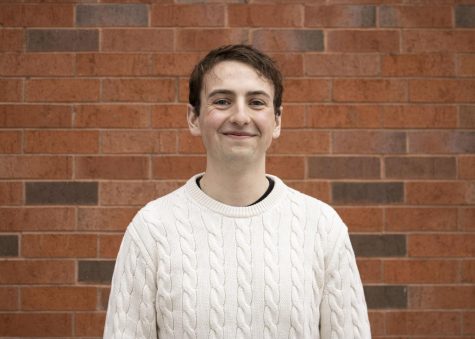Data-driven research boosted by new supercomputing system
A “powerful partnership” between UW-Eau Claire and HPE provides new opportunities for undergraduate research and public collaboration
Photo by SUBMITTED
The partnership creates enormous opportunities for many disciplines and majors, Bhattacharyay said.
UW-Eau Claire is partnering with computer company Hewlett Packard Enterprise in a collaboration which allows the University to purchase a new high-performance supercomputer system.
The partnership was announced by Chancellor James C. Schmidt at a press conference on April 26. The new supercomputing cluster system will allow students to conduct research in multiple areas involving computer science.
UW-Eau Claire will be one of the few primarily undergraduate institution universities in the country to use this type of HPE supercomputer cluster hardware.
The money to purchase the system totals over $700,000 and comes from three main sources: Hewlett Packard Enterprise, the National Science Foundation and UW-Eau Claire’s College of Arts and Sciences and the Office of Research and Sponsored Programs.
Sudeep Bhattacharyay, associate professor of chemistry and biochemistry, is one of the main initiators and drivers of the University’s supercomputing program.
He helped obtain the current supercomputing system in 2014, called the Blugold Supercomputer Cluster, housed in Phillips Hall.
Bhattacharyay said although the BGSC system works well, it is time for a better, updated system. The new HPE supercomputing cluster will be able to perform computations up to 100 times faster than the current BGSC system, he said.
For Bhattacharyay and UW-Eau Claire, student access and development are a priority. High-impact undergraduate experiences, including research, are incredibly important to UW-Eau Claire, Bhattacharyay said, and the cluster is a cost-saving means to provide those experiences.
Students have already been experiencing those high-impact experiences through the BGSC. Alyssa Huelsbeck, a fourth-year biochemistry, molecular biology and Spanish student worked with Bhattacharyay to conduct research on the COVID-19 virus.
Specifically, Huelsbeck studied the COVID-19 spike protein — the piece of the virus that allows it to bind to human receptor cells. Huelsbeck said she didn’t expect to be able to use a supercomputing system, and it was a great opportunity.
“I think the new system makes research really accessible to undergraduate students,” Huelsbeck said. “I did really relevant and very important research to learn about the spike protein and how the virus works.”
Huelsbeck said the research group has presented their findings at the National Conference for Undergraduate Research, UW-Eau Claire’s Celebration of Excellence in Research and Creative Activity and are now working on publishing a paper of their research.
The new supercomputing cluster will allow “huge” opportunities for collaboration beyond UW-Eau Claire, Bhattacharyay said, including public work with the Mayo Clinic and HPE.
Bhattacharyay listed some of the possibilities for practical application with the Mayo Clinic, including research on bioinformatics, computer aided drug design and understanding and researching disease, among many others.
“The Mayo Clinic wants to see this computer and data science applied to health care,” Bhattacharyay said. “HPE wants to grow and develop their coding technique through us, and we want to give high-impact practices to our students.”
Chip Eckardt, senior information processing consultant at UW-Eau Claire, also has a hand in the supercomputing program and process. The new system will allow students from multiple majors and disciplines to conduct research, he said, and will make the University stand out.
“Well, I’m biased of course, but I think this is going to set us above all our peers,” Eckardt said. “It can be used for all sorts of things, even in the art department. I mean, the sky’s the limit on this stuff.”
Eckardt said that the cluster will make UW-Eau Claire a ‘hub’ for research and computing power in the Midwest and for the UW System.
“It’s going to save a lot of money, but it will also help the learning experience,” Eckardt said. “It’s going to be just huge. This is going to set the university and education research on end.”
DeLapp can be reached at [email protected].

Thomas DeLapp is a fourth-year English and journalism student, and this is his fifth semester on staff. He loves oxford commas and loathes AP style for taking them away from him.











